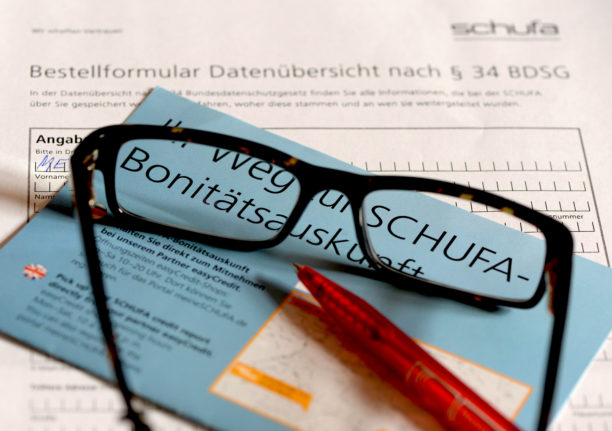Schufa: How foreigners can improve their German credit score

Whether you've seen your credit score or not, this unassuming number can have a big impact on your life in Germany. Here's how to find out more about your Schufa rating and what to do to improve it.
Do I even have a German credit score?
You should do. As soon as any new arrival registers at an address in Germany, an organisation known as the Schutzgemeinschaft für Allgemeine Kreditsicherung (the General Credit Protection Agency) sets up a credit score for you and starts tracking your financial behaviour.
This company, which is known as Schufa for short, is essentially there to help people avoid racking up tonnes of debt - but the data they have on you is used by all sorts of credit institutions to decide whether you're likely to be a trustworthy person to lend to.
While this may not sound relevant for anyone who isn't taking out a bank loan or mortgage, the information in the Schufa can impact a number of day to day things in Germany. You're likely to need it when applying for flats, and internet and phone providers, gyms and banks are all likely to run checks on you before accepting you as a customer. In other words, the Schufa can be your best friend in Germany - or your worst enemy.
READ ALSO: What are the best banks for foreigners in Germany?
Where can I find my German credit score?
Everyone is entitled to a free copy of their Schufa report once a year to keep track of their credit rating. You can get hold of this by filling in your details online at meinSchufa.de. To get the free version, you'll need to order the 'Datenkopie nach Art. 15 DS-GVO', so click on 'Datenkopie bestellen' at the bottom of the home page, fill in the form and upload a scan of your passport or personal ID card.
The paper report will be sent by post and will contain some basic information like the date that your Schufa began, the dates you took out certain contracts like bank accounts or an internet contract, and your overall credit score.
While this can be useful for applying for contracts, however, most landlords won't accept it for the purposes of renting a property. This is because it doesn't contain detailed information about your financial history and is really intended for your eyes only.

A pair of glasses lie on top of a German credit report. Photo: picture alliance / Jens Kalaene/dpa-Zentralbild/dpa | Jens Kalaene
If you want a more detailed breakdown of your credit score, you'll need what's known as the 'Schufa-BonitätsAuskunft'. In other words, an official Schufa credit report.
This costs €29.95 and can also be ordered via meinSchufa.de for delivery by post. If you need it faster, however, you can also get it the same day by going to your nearest Postbank or Volksbank branch with your passport and Meldebescheinigung (the piece of paper you got when you registered at your address).
Alternatively, you can order an online version of the Schufa-BonitätsAuskunft that will be sent to you within five minutes. This contains less information than the paper copy but will usually suffice in an emergency - for instance, if you have a house viewing the same afternoon and can't make it to the bank.
What counts as a good Schufa rating?
A Schufa rating is calculated in percentage points up to 100, with 100 being the absolute best and 0 being the worst.
Everyone starts with a 'perfect' score of 100, but points can get docked for things like missed or late payments, unsuccessful credit applications or staying in your overdraft for long periods of time.
This is how many lenders will see you depending on your score:
- 97.5 and above: Very low risk
- 95 - 97.5: Low to negligible risk
- 90 - 95: Satisfactory to increased risk
- 80 - 90: Increased to high risk
- 50 - 80: Very high risk
- 50 and below: Critical risk
In a competitive housing market, having a score even slightly below 95 could mean that landlords start to see you as a slightly more risky option, and may go for someone who appears to have a cleaner financial history.
By the time your score goes below 90, you could start to have problems getting accepted for certain contracts or loans, and a score below 80 could be disastrous. So unless you have a near perfect number on that Schufa, it almost always pays to increase your score.
READ ALSO: Schufa explained: How to avoid the ‘catch 22’ in Germany’s credit rating system
How do I improve my Schufa score?
Building up your credit rating is more of an art than an exact science, but two of the most important factors are stability and consistency.
While foreigners from other countries may be used to juggling multiple credit cards or bank accounts, this kind of thing is frowned upon in Germany and is unlikely to have a positive effect on your Schufa.
It's best to try and limit yourself to one or two credit cards and no more than two or three German bank accounts, unless you have a really good reason for needing more. Credit card payments should be made on time each month and, if possible, you should try and avoid having low balances or slipping into the red in your bank accounts.

A smashed piggy bank. Having fewer accounts to your name is an easy way to improve your Schufa score. Photo: picture alliance / dpa | Peter Kneffel
Having a limited number of accounts can also help you keep track of things like direct debits and other outgoings. It also makes it more likely that you'll actually use your credit cards and various accounts - which is a good thing since having unused cards and accounts can also be a red flag for lenders.
Once you have everything set up, try and avoid switching accounts too regularly, as this can also have a negative impact on your score. The same goes for moving house every few months or taking out new forms of credit on a regular basis.
Other ways to brush up your Schufa score include:
- Consolidating loans: One larger loan looks better on your credit report than several smaller ones, so consolidate your debts where possible
- Closing accounts, contracts and credit cards you don't need or that are inactive
- Paying off credit balances and trying not to add to them
- Getting incorrect entries on your Schufa report deleted
- Addressing any issues that could affect your Schufa report as soon as possible and asking the company to withdraw their statement to Schufa
- Adding an overdraft facility to your bank account - but staying within its limits
What else do I need to know?
It's worth taking advantage of the free Schufa reports each year simply to keep on top of your creditworthiness and find out if anything could be harming your score. Getting turned down for credit is a sure-fire way to affect your rating, so you may decide to try and build up your score over time before applying for a new credit card or contract.
Speaking of contracts, foreigners should be aware that the default contract length in Germany is usually 24 months. Once you've agreed to this, it can be hard to get out of, and missing payments can have a big impact on your Schufa score. To try and keep a healthy rating, make sure you know exactly what you're signing up for ahead of time and consider whether you can meet those financial commitments.
It's also worth knowing the difference between a Kreditanfrage and a Konditionsanfrage when researching conditions for loans or other financial services. Putting in a credit request, or Kreditanfrage, can have a negative impact on your credit score because it can look as if you're repeatedly getting rejected by lenders.
Instead, be sure to opt for a Konditionsanfrage - or condition request - which won't have any impact on your credit score.
READ ALSO: How Germany is making it easier for consumers to cancel contracts
Comments
See Also
Do I even have a German credit score?
You should do. As soon as any new arrival registers at an address in Germany, an organisation known as the Schutzgemeinschaft für Allgemeine Kreditsicherung (the General Credit Protection Agency) sets up a credit score for you and starts tracking your financial behaviour.
This company, which is known as Schufa for short, is essentially there to help people avoid racking up tonnes of debt - but the data they have on you is used by all sorts of credit institutions to decide whether you're likely to be a trustworthy person to lend to.
While this may not sound relevant for anyone who isn't taking out a bank loan or mortgage, the information in the Schufa can impact a number of day to day things in Germany. You're likely to need it when applying for flats, and internet and phone providers, gyms and banks are all likely to run checks on you before accepting you as a customer. In other words, the Schufa can be your best friend in Germany - or your worst enemy.
READ ALSO: What are the best banks for foreigners in Germany?
Where can I find my German credit score?
Everyone is entitled to a free copy of their Schufa report once a year to keep track of their credit rating. You can get hold of this by filling in your details online at meinSchufa.de. To get the free version, you'll need to order the 'Datenkopie nach Art. 15 DS-GVO', so click on 'Datenkopie bestellen' at the bottom of the home page, fill in the form and upload a scan of your passport or personal ID card.
The paper report will be sent by post and will contain some basic information like the date that your Schufa began, the dates you took out certain contracts like bank accounts or an internet contract, and your overall credit score.
While this can be useful for applying for contracts, however, most landlords won't accept it for the purposes of renting a property. This is because it doesn't contain detailed information about your financial history and is really intended for your eyes only.

If you want a more detailed breakdown of your credit score, you'll need what's known as the 'Schufa-BonitätsAuskunft'. In other words, an official Schufa credit report.
What counts as a good Schufa rating?
A Schufa rating is calculated in percentage points up to 100, with 100 being the absolute best and 0 being the worst.
Everyone starts with a 'perfect' score of 100, but points can get docked for things like missed or late payments, unsuccessful credit applications or staying in your overdraft for long periods of time.
This is how many lenders will see you depending on your score:
- 97.5 and above: Very low risk
- 95 - 97.5: Low to negligible risk
- 90 - 95: Satisfactory to increased risk
- 80 - 90: Increased to high risk
- 50 - 80: Very high risk
- 50 and below: Critical risk
In a competitive housing market, having a score even slightly below 95 could mean that landlords start to see you as a slightly more risky option, and may go for someone who appears to have a cleaner financial history.
By the time your score goes below 90, you could start to have problems getting accepted for certain contracts or loans, and a score below 80 could be disastrous. So unless you have a near perfect number on that Schufa, it almost always pays to increase your score.
READ ALSO: Schufa explained: How to avoid the ‘catch 22’ in Germany’s credit rating system
How do I improve my Schufa score?
Building up your credit rating is more of an art than an exact science, but two of the most important factors are stability and consistency.
While foreigners from other countries may be used to juggling multiple credit cards or bank accounts, this kind of thing is frowned upon in Germany and is unlikely to have a positive effect on your Schufa.
It's best to try and limit yourself to one or two credit cards and no more than two or three German bank accounts, unless you have a really good reason for needing more. Credit card payments should be made on time each month and, if possible, you should try and avoid having low balances or slipping into the red in your bank accounts.

Having a limited number of accounts can also help you keep track of things like direct debits and other outgoings. It also makes it more likely that you'll actually use your credit cards and various accounts - which is a good thing since having unused cards and accounts can also be a red flag for lenders.
Once you have everything set up, try and avoid switching accounts too regularly, as this can also have a negative impact on your score. The same goes for moving house every few months or taking out new forms of credit on a regular basis.
Other ways to brush up your Schufa score include:
- Consolidating loans: One larger loan looks better on your credit report than several smaller ones, so consolidate your debts where possible
- Closing accounts, contracts and credit cards you don't need or that are inactive
- Paying off credit balances and trying not to add to them
- Getting incorrect entries on your Schufa report deleted
- Addressing any issues that could affect your Schufa report as soon as possible and asking the company to withdraw their statement to Schufa
- Adding an overdraft facility to your bank account - but staying within its limits
What else do I need to know?
It's worth taking advantage of the free Schufa reports each year simply to keep on top of your creditworthiness and find out if anything could be harming your score. Getting turned down for credit is a sure-fire way to affect your rating, so you may decide to try and build up your score over time before applying for a new credit card or contract.
Speaking of contracts, foreigners should be aware that the default contract length in Germany is usually 24 months. Once you've agreed to this, it can be hard to get out of, and missing payments can have a big impact on your Schufa score. To try and keep a healthy rating, make sure you know exactly what you're signing up for ahead of time and consider whether you can meet those financial commitments.
It's also worth knowing the difference between a Kreditanfrage and a Konditionsanfrage when researching conditions for loans or other financial services. Putting in a credit request, or Kreditanfrage, can have a negative impact on your credit score because it can look as if you're repeatedly getting rejected by lenders.
Instead, be sure to opt for a Konditionsanfrage - or condition request - which won't have any impact on your credit score.
READ ALSO: How Germany is making it easier for consumers to cancel contracts
Join the conversation in our comments section below. Share your own views and experience and if you have a question or suggestion for our journalists then email us at [email protected].
Please keep comments civil, constructive and on topic – and make sure to read our terms of use before getting involved.
Please log in here to leave a comment.